.gif)
Orestes (mythology)
Encyclopedia
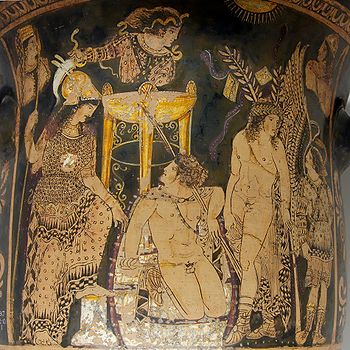
Greek mythology
Greek mythology is the body of myths and legends belonging to the ancient Greeks, concerning their gods and heroes, the nature of the world, and the origins and significance of their own cult and ritual practices. They were a part of religion in ancient Greece...
, Orestes (ɒˈrɛstiːz; oˈrestɛːs) was the son of Clytemnestra
Clytemnestra
Clytemnestra or Clytaemnestra , in ancient Greek legend, was the wife of Agamemnon, king of the Ancient Greek kingdom of Mycenae or Argos. In the Oresteia by Aeschylus, she was a femme fatale who murdered her husband, Agamemnon – said by Euripides to be her second husband – and the Trojan princess...
and Agamemnon
Agamemnon
In Greek mythology, Agamemnon was the son of King Atreus and Queen Aerope of Mycenae, the brother of Menelaus, the husband of Clytemnestra, and the father of Electra and Orestes. Mythical legends make him the king of Mycenae or Argos, thought to be different names for the same area...
. He is the subject of several Ancient Greek plays and of various myths connected with his madness and purification, which retain obscure threads of much older ones.
Orestes has a root in ὄρος (óros), "mountain". The metaphoric meaning of the name is the person "who can conquer mountains".
Homer
In the HomerHomer
In the Western classical tradition Homer , is the author of the Iliad and the Odyssey, and is revered as the greatest ancient Greek epic poet. These epics lie at the beginning of the Western canon of literature, and have had an enormous influence on the history of literature.When he lived is...
ic story, Orestes was a member of the doomed house of Atreus which is descended from Tantalus
Tantalus
Tantalus was the ruler of an ancient western Anatolian city called either after his name, as "Tantalís", "the city of Tantalus", or as "Sipylus", in reference to Mount Sipylus, at the foot of which his city was located and whose ruins were reported to be still visible in the beginning of the...
and Niobe
Niobe
Niobe was a daughter of Tantalus and of either Dione, the most frequently cited, or of Eurythemista or Euryanassa, and she was the sister of Pelops and Broteas, all of whom figure in Greek mythology....
. Orestes was absent from Mycenae
Mycenae
Mycenae is an archaeological site in Greece, located about 90 km south-west of Athens, in the north-eastern Peloponnese. Argos is 11 km to the south; Corinth, 48 km to the north...
when his father, Agamemnon
Agamemnon
In Greek mythology, Agamemnon was the son of King Atreus and Queen Aerope of Mycenae, the brother of Menelaus, the husband of Clytemnestra, and the father of Electra and Orestes. Mythical legends make him the king of Mycenae or Argos, thought to be different names for the same area...
, returned from the Trojan War
Trojan War
In Greek mythology, the Trojan War was waged against the city of Troy by the Achaeans after Paris of Troy took Helen from her husband Menelaus, the king of Sparta. The war is among the most important events in Greek mythology and was narrated in many works of Greek literature, including the Iliad...
with the Trojan princess Cassandra
Cassandra
In Greek mythology, Cassandra was the daughter of King Priam and Queen Hecuba of Troy. Her beauty caused Apollo to grant her the gift of prophecy...
as his concubine, and thus not present for Agamemnon's murder by his wife, Clytemnestra
Clytemnestra
Clytemnestra or Clytaemnestra , in ancient Greek legend, was the wife of Agamemnon, king of the Ancient Greek kingdom of Mycenae or Argos. In the Oresteia by Aeschylus, she was a femme fatale who murdered her husband, Agamemnon – said by Euripides to be her second husband – and the Trojan princess...
, in retribution for his sacrifice of their daughter Iphigenia to obtain favorable winds during the Greek voyage to Troy. Seven years later, Orestes returned from Athens
Athens
Athens , is the capital and largest city of Greece. Athens dominates the Attica region and is one of the world's oldest cities, as its recorded history spans around 3,400 years. Classical Athens was a powerful city-state...
and with his sister Electra
Electra
In Greek mythology, Electra was an Argive princess and daughter of King Agamemnon and Queen Clytemnestra. She and her brother Orestes plotted revenge against their mother Clytemnestra and stepfather Aegisthus for the murder of their father Agamemnon...
avenged his father's death by slaying his mother and her lover Aegisthus
Aegisthus
In Greek mythology, Aegisthus was the son of Thyestes and of Thyestes' daughter, Pelopia....
.
In the Odyssey
Odyssey
The Odyssey is one of two major ancient Greek epic poems attributed to Homer. It is, in part, a sequel to the Iliad, the other work ascribed to Homer. The poem is fundamental to the modern Western canon, and is the second—the Iliad being the first—extant work of Western literature...
, Orestes is held up as a favorable example to Telemachus
Telemachus
Telemachus is a figure in Greek mythology, the son of Odysseus and Penelope, and a central character in Homer's Odyssey. The first four books in particular focus on Telemachus' journeys in search of news about his father, who has been away at war...
, whose mother Penelope
Penelope
In Homer's Odyssey, Penelope is the faithful wife of Odysseus, who keeps her suitors at bay in his long absence and is eventually reunited with him....
is plagued by suitors.
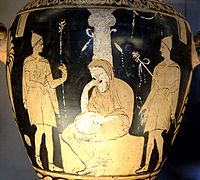
Pindar
According to PindarPindar
Pindar , was an Ancient Greek lyric poet. Of the canonical nine lyric poets of ancient Greece, his work is the best preserved. Quintilian described him as "by far the greatest of the nine lyric poets, in virtue of his inspired magnificence, the beauty of his thoughts and figures, the rich...
, the young Orestes was saved by his nurse Arsinoe or his sister Electra, who conveyed him out of the country when Clytemnestra wished to kill him. In the familiar theme of the hero's early eclipse and exile, he escaped to Phanote
Raveni
Raveni is a village in Thesprotia, Greece. It was the ancient city of Fanoti, part of the kingdom of Thesprotia. It lies on the foothills of the mountain of Mourgana, where many battles of the Greek civil war took place after the Second World War...
on Mount Parnassus
Mount Parnassus
Mount Parnassus, also Parnassos , is a mountain of limestone in central Greece that towers above Delphi, north of the Gulf of Corinth, and offers scenic views of the surrounding olive groves and countryside. According to Greek mythology, this mountain was sacred to Apollo and the Corycian nymphs,...
, where King Strophius
Strophius
In Greek mythology, Strophius, son of Crisus, was a King of Phocis, husband of the sister of Agamemnon and by her father of Pylades and Astydameia. When Orestes was hiding from his murderous mother, Clytemnestra, Strophius hid him...
took charge of him. In his twentieth year, he was urged by Electra to return home and avenge his father's death. He returned home along with his friend Pylades
Pylades
In Greek mythology, Pylades is the son of King Strophius of Phocis and of Anaxibia, daughter of Atreus and sister of Agamemnon and Menelaus. He is mostly known for his strong friendship with his cousin Orestes, son of Agamemnon.-Orestes and Pylades:...
, Strophius's son.
Sophocles and Euripides
The same myth is told differently by SophoclesSophocles
Sophocles is one of three ancient Greek tragedians whose plays have survived. His first plays were written later than those of Aeschylus, and earlier than or contemporary with those of Euripides...
and Euripides
Euripides
Euripides was one of the three great tragedians of classical Athens, the other two being Aeschylus and Sophocles. Some ancient scholars attributed ninety-five plays to him but according to the Suda it was ninety-two at most...
in their Electra plays.
Robert Graves
In The Greek MythsThe Greek Myths
The Greek Myths is a mythography, a compendium of Greek mythology, by the poet and writer Robert Graves, normally published in two volumes....
the mythographer and poet, Robert Graves
Robert Graves
Robert von Ranke Graves 24 July 1895 – 7 December 1985 was an English poet, translator and novelist. During his long life he produced more than 140 works...
, translates and interprets the legends and myth fragments about Clytemnestra, Agamemnon, and Orestes, as suggesting a ritual killing of a "king" (Agamemnon) in very early religious ceremonies that were suppressed when patriarchy
Patriarchy
Patriarchy is a social system in which the role of the male as the primary authority figure is central to social organization, and where fathers hold authority over women, children, and property. It implies the institutions of male rule and privilege, and entails female subordination...
replaced the matriarchies of very ancient Greece. Graves asserts that the sacrilege
Sacrilege
Sacrilege is the violation or injurious treatment of a sacred object. In a less proper sense, any transgression against the virtue of religion would be a sacrilege. It can come in the form of irreverence to sacred persons, places, and things...
for which the Erinyes pursued Orestes was actually the killing of his mother, who represented matriarchy
Matriarchy
A matriarchy is a society in which females, especially mothers, have the central roles of political leadership and moral authority. It is also sometimes called a gynocratic or gynocentric society....
. He explains that worship of Athena
Athena
In Greek mythology, Athena, Athenê, or Athene , also referred to as Pallas Athena/Athene , is the goddess of wisdom, courage, inspiration, civilization, warfare, strength, strategy, the arts, crafts, justice, and skill. Minerva, Athena's Roman incarnation, embodies similar attributes. Athena is...
was retained as a cult because it was too strong to be suppressed, but she was recast as a child of Zeus in new myths, even given the previously incomprehensible role of justifying what would have been a horrific crime against the old religious customs. Graves, and many other mythographers, were influenced by The Golden Bough
The Golden Bough
The Golden Bough: A Study in Magic and Religion is a wide-ranging, comparative study of mythology and religion, written by Scottish anthropologist Sir James George Frazer . It first was published in two volumes in 1890; the third edition, published 1906–15, comprised twelve volumes...
of James Frazer
James Frazer
Sir James George Frazer , was a Scottish social anthropologist influential in the early stages of the modern studies of mythology and comparative religion...
, and since it was published many myths have been reinterpreted to reveal clues to ancient religious practices that were kept as secret rituals.
Greek drama
_-_the_remorse_of_orestes_(1862).jpg)
Aeschylus
The story of Orestes was the subject of the Oresteia of Aeschylus (Agamemnon, Choephori, Eumenides), of the ElectraElectra (Sophocles)
Electra or Elektra is a Greek tragedy by Sophocles. Its date is not known, but various stylistic similarities with the Philoctetes and the Oedipus at Colonus lead scholars to suppose that it was written towards the end of Sophocles' career.Set in the city of Argos a few years after the Trojan...
of Sophocles
Sophocles
Sophocles is one of three ancient Greek tragedians whose plays have survived. His first plays were written later than those of Aeschylus, and earlier than or contemporary with those of Euripides...
, and of the Electra
Electra (Euripides)
Euripides' Electra was a play probably written in the mid 410s BC, likely after 413 BC. It is unclear whether it was first produced before or after Sophocles' version of the Electra story.-Background:...
, Iphigeneia in Tauris
Iphigeneia in Tauris
Iphigenia in Tauris is a drama by the playwright Euripides, written between 414 BC and 412 BC. It has much in common with another of Euripides's plays, Helen, and is often described as a romance, a melodrama or an escape play.-Background:...
, Iphigenia at Aulis (in which he appears as an infant carried by Clytemnestra), and Orestes
Orestes (play)
Orestes is an Ancient Greek play by Euripides that follows the events of Orestes after he had murdered his mother.-Background:...
, of Euripides.
In Aeschylus
Aeschylus
Aeschylus was the first of the three ancient Greek tragedians whose work has survived, the others being Sophocles and Euripides, and is often described as the father of tragedy. His name derives from the Greek word aiskhos , meaning "shame"...
's Eumenides
Eumenides
Eumenides may refer to:* Another name for the Erinyes, Greek deities of vengeance* The Eumenides, the third part of Aeschylus' Greek tragedy, the Oresteia...
, Orestes goes mad after the deed and is pursued by the Erinyes
Erinyes
In Greek mythology the Erinyes from Greek ἐρίνειν " pursue, persecute"--sometimes referred to as "infernal goddesses" -- were female chthonic deities of vengeance. A formulaic oath in the Iliad invokes them as "those who beneath the earth punish whosoever has sworn a false oath"...
, whose duty it is to punish any violation of the ties of family piety. He takes refuge in the temple at Delphi
Delphi
Delphi is both an archaeological site and a modern town in Greece on the south-western spur of Mount Parnassus in the valley of Phocis.In Greek mythology, Delphi was the site of the Delphic oracle, the most important oracle in the classical Greek world, and a major site for the worship of the god...
; but, even though Apollo had ordered him to do the deed, he is powerless to protect Orestes from the consequences. At last Athena
Athena
In Greek mythology, Athena, Athenê, or Athene , also referred to as Pallas Athena/Athene , is the goddess of wisdom, courage, inspiration, civilization, warfare, strength, strategy, the arts, crafts, justice, and skill. Minerva, Athena's Roman incarnation, embodies similar attributes. Athena is...
receives him on the acropolis of Athens
Acropolis of Athens
The Acropolis of Athens or Citadel of Athens is the best known acropolis in the world. Although there are many other acropoleis in Greece, the significance of the Acropolis of Athens is such that it is commonly known as The Acropolis without qualification...
and arranges a formal trial of the case before twelve judges, including herself. The Erinyes demand their victim; he pleads the orders of Apollo. Athena
Athena
In Greek mythology, Athena, Athenê, or Athene , also referred to as Pallas Athena/Athene , is the goddess of wisdom, courage, inspiration, civilization, warfare, strength, strategy, the arts, crafts, justice, and skill. Minerva, Athena's Roman incarnation, embodies similar attributes. Athena is...
votes last announcing that she is for acquittal; then the votes are counted and the result is a tie, resulting in an acquittal according to the rules previously stipulated by Athena. The Erinyes are propitiated by a new ritual, in which they are worshipped as "Semnai Theai", "Venerable Ones", and Orestes dedicates an altar to Athena Areia.
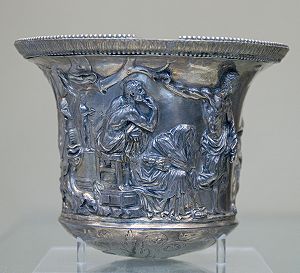
Euripides
As Aeschylus tells it, the punishment ended there, but according to Euripides, in order to escape the persecutions of the Erinyes, Orestes was ordered by Apollo to go to Tauris, carry off the statue of Artemis which had fallen from heaven, and to bring it to Athens. He went to Tauris with PyladesPylades
In Greek mythology, Pylades is the son of King Strophius of Phocis and of Anaxibia, daughter of Atreus and sister of Agamemnon and Menelaus. He is mostly known for his strong friendship with his cousin Orestes, son of Agamemnon.-Orestes and Pylades:...
, and the pair are at once imprisoned by the people, among whom the custom was to sacrifice all Greek strangers to Artemis. The priestess of Artemis, whose duty it was to perform the sacrifice, was Orestes' sister Iphigenia. She offered to release him if he would carry home a letter from her to Greece; he refused to go, but bids Pylades to take the letter while he stays to be slain. After a conflict of mutual affection, Pylades at last yielded, but the letter brought about the recognition of brother and sister, and all three escaped together, carrying with them the image of Artemis.
Other literature and media
After his return to Greece, Orestes took possession of his father's kingdom of Mycenae (killing Aegisthus' son, AleteAlete
For other mythological heroes, see AletesIn Greek mythology, Aletes was the son of Aegisthus and Clytemnestra, the king and queen of Mycenae. He had two sisters: Erigone and Helen...
) to which were added Argos
Argos
Argos is a city and a former municipality in Argolis, Peloponnese, Greece. Since the 2011 local government reform it is part of the municipality Argos-Mykines, of which it is a municipal unit. It is 11 kilometres from Nafplion, which was its historic harbour...
and Laconia
Laconia
Laconia , also known as Lacedaemonia, is one of the regional units of Greece. It is part of the region of Peloponnese. It is situated in the southeastern part of the Peloponnese peninsula. Its administrative capital is Sparti...
. He was said to have died of a snakebite
Serpent (symbolism)
Serpent in Latin means: Rory Collins :&, in turn, from the Biblical Hebrew word of: "saraf" with root letters of: which refers to something burning-as, the pain of poisonous snake's bite was likened to internal burning.This word is commonly used in a specifically mythic or religious context,...
in Arcadia
Arcadia
Arcadia is one of the regional units of Greece. It is part of the administrative region of Peloponnese. It is situated in the central and eastern part of the Peloponnese peninsula. It takes its name from the mythological character Arcas. In Greek mythology, it was the home of the god Pan...
. His body was conveyed to Sparta for burial (where he was the object of a cult
Cult
The word cult in current popular usage usually refers to a group whose beliefs or practices are considered abnormal or bizarre. The word originally denoted a system of ritual practices...
) or, according to a Roman legend, to Aricia, when it was removed to Rome (Servius on Aeneid
Aeneid
The Aeneid is a Latin epic poem, written by Virgil between 29 and 19 BC, that tells the legendary story of Aeneas, a Trojan who travelled to Italy, where he became the ancestor of the Romans. It is composed of roughly 10,000 lines in dactylic hexameter...
, ii. 116).
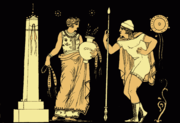
Trojan War
In Greek mythology, the Trojan War was waged against the city of Troy by the Achaeans after Paris of Troy took Helen from her husband Menelaus, the king of Sparta. The war is among the most important events in Greek mythology and was narrated in many works of Greek literature, including the Iliad...
, Orestes was to marry his cousin Hermione
Hermione (mythology)
In Greek mythology, Hermione was the only daughter of Menelaus and Helen; however, some sources state that her mother also had a daughter, Iphigenia, by Theseus, as well as three younger sons, one by Menelaus, the others by Paris, prince of Troy.Hermione was nine when her mother left with Paris...
, daughter of Menelaus
Menelaus
Menelaus may refer to;*Menelaus, one of the two most known Atrides, a king of Sparta and son of Atreus and Aerope*Menelaus on the Moon, named after Menelaus of Alexandria.*Menelaus , brother of Ptolemy I Soter...
and Helen. Things soon changed after Orestes committed matricide
Matricide
Matricide is the act of killing one's mother. As for any type of killing, motives can vary significantly.- Known or suspected matricides :* Amastris, queen of Heraclea, was drowned by her two sons in 284 BC....
: Menelaus then gave his daughter to Neoptolemus
Neoptolemus
Neoptolemus was the son of the warrior Achilles and the princess Deidamia in Greek mythology. Achilles' mother foretold many years before Achilles' birth that there would be a great war. She saw that her only son was to die if he fought in the war...
, son of Achilles
Achilles
In Greek mythology, Achilles was a Greek hero of the Trojan War, the central character and the greatest warrior of Homer's Iliad.Plato named Achilles the handsomest of the heroes assembled against Troy....
and Deidamia. According to Euripides' play Andromache, Orestes slew Neoptolemus just outside a temple and took off with his cousin, Hermione. He seized Argos and Arcadia
Arcadia
Arcadia is one of the regional units of Greece. It is part of the administrative region of Peloponnese. It is situated in the central and eastern part of the Peloponnese peninsula. It takes its name from the mythological character Arcas. In Greek mythology, it was the home of the god Pan...
after their thrones had become vacant, becoming ruler of all the Peloponnesus. His son by Hermione, Tisamenus
Tisamenus
Tisamenus or Tissamenus in Greek mythology, was a son of Orestes and Hermione. He succeeded his father to the thrones of Argos, Mycenae and Sparta and was later killed in the final battle with the Heracleidae. The latter were led by Aristodemus, Cresphontes, Oxylus, Temenus and sought to retake...
, became ruler after him but was eventually killed by the Heracleidae
Heracleidae
In Greek mythology, the Heracleidae or Heraclids were the numerous descendants of Heracles , especially applied in a narrower sense to the descendants of Hyllus, the eldest of his four sons by Deianira Other Heracleidae included Macaria, Lamos, Manto, Bianor, Tlepolemus, and Telephus...
.
There is extant a Latin
Latin
Latin is an Italic language originally spoken in Latium and Ancient Rome. It, along with most European languages, is a descendant of the ancient Proto-Indo-European language. Although it is considered a dead language, a number of scholars and members of the Christian clergy speak it fluently, and...
epic poem
Epic poetry
An epic is a lengthy narrative poem, ordinarily concerning a serious subject containing details of heroic deeds and events significant to a culture or nation. Oral poetry may qualify as an epic, and Albert Lord and Milman Parry have argued that classical epics were fundamentally an oral poetic form...
, consisting of about 1000 hexameter
Hexameter
Hexameter is a metrical line of verse consisting of six feet. It was the standard epic metre in classical Greek and Latin literature, such as in the Iliad and Aeneid. Its use in other genres of composition include Horace's satires, and Ovid's Metamorphoses. According to Greek mythology, hexameter...
s, called Orestes Tragoedia, which has been ascribed to Dracontius of Carthage.
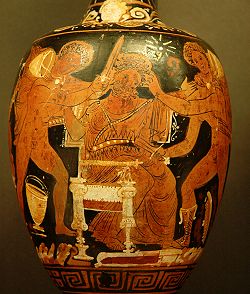
In one version of the story of Telephus
Telephus
A Greek mythological figure, Telephus or Telephos Telephus was one of the Heraclidae, the sons of Heracles, who were venerated as founders of cities...
, Orestes was held captive by King Telephus, demanding that Achilles
Achilles
In Greek mythology, Achilles was a Greek hero of the Trojan War, the central character and the greatest warrior of Homer's Iliad.Plato named Achilles the handsomest of the heroes assembled against Troy....
heal him.
According to some sources, Orestes fathered Penthilus
Penthilus
- Son of Orestes and Erigone :Penthilus was the illegitimate son of half-siblings Orestes and Erigone. Erigone was the daughter of Clytemnestra and Aigisthos , while Orestes was the son of Clytemnestra and Agamemnon. Erigone is said to have hanged herself. Orestes was ruler over much of the...
by his half-sister, Erigone
Erigone (daughter of Aegisthus)
In Greek mythology Erigone was the daughter of Aegisthus and Clytemnestra, rulers of Mycenae. By her half-brother, Orestes, Erigone was the mother of Penthilus. She would have also been slain by Orestes along with her brother Aletes if not for the intervention of Diana, who rescued her and made her...
.
In The History
Histories (Herodotus)
The Histories of Herodotus is considered one of the seminal works of history in Western literature. Written from the 450s to the 420s BC in the Ionic dialect of classical Greek, The Histories serves as a record of the ancient traditions, politics, geography, and clashes of various cultures that...
by Herodotus
Herodotus
Herodotus was an ancient Greek historian who was born in Halicarnassus, Caria and lived in the 5th century BC . He has been called the "Father of History", and was the first historian known to collect his materials systematically, test their accuracy to a certain extent and arrange them in a...
, the Oracle of Delphi foretold that the Sparta
Sparta
Sparta or Lacedaemon, was a prominent city-state in ancient Greece, situated on the banks of the River Eurotas in Laconia, in south-eastern Peloponnese. It emerged as a political entity around the 10th century BC, when the invading Dorians subjugated the local, non-Dorian population. From c...
ns could not defeat the Tegea
Tegea
Tegea was a settlement in ancient Greece, and it is also a former municipality in Arcadia, Peloponnese, Greece. Since the 2011 local government reform it is part of the municipality Tripoli, of which it is a municipal unit. Its seat was the village Stadio....
ns until they moved the bones of Orestes to Sparta. Lichas
Lichas
In Greek mythology, Lichas was Hercules' servant, who brought the poisoned shirt from Deianira to Hercules because of her jealousy of Iole, killing him...
discovered the body, which measured 7 cubits long (around 10 feet, or 3.30 meters). Thus Orestes would have been a Giant
Giant (mythology)
The mythology and legends of many different cultures include monsters of human appearance but prodigious size and strength. "Giant" is the English word commonly used for such beings, derived from one of the most famed examples: the gigantes of Greek mythology.In various Indo-European mythologies,...
.
For modern treatments see the Oresteia in the arts and popular culture
The Oresteia in the arts and popular culture
Reflections of the Oresteia in the arts and popular culture show the influence of the classic trilogy of tragedies by Aeschylus.-Opera, ballet and incidental music:...
.

